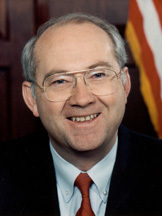A Quote by Al Gore
Eventually we'll use a CO2 tax offset by a reduction in taxes elsewhere alongside a cap-and-trade plan, but the degree of difficulty associated with a CO2 tax far exceeds that with a cap-and-trade plan. We're seeing it's hard to get a cap-and-trade plan and it's much easier to use as a basis for a global agreement than a CO2 tax.
Related Quotes
There's such a wide variation in tax systems around the world, it's difficult to imagine a harmonized CO2 tax that every country agrees to. That's not in the cards in the near term. But the countries that are doing the best job, like Sweden, are already doing both of these. I think that eventually we'll use both of them but we need to get started right away and the cap-and-trade is a proven and effective tool.
[Barack] Obama, for example, he has not given up on cap-and-trade. Now, he has not been able to pass cap-and-trade, but cap-and-trade is all about redistribution of wealth in a global basis - taking money out of this country and giving it to third-world countries on the other end of the ocean. And that is redistribution of wealth in a global basis. It's fundamental Marxism.
To some, a cap-and-trade system might sound like a neat approach where the market sorts everything out. But in fact, in some ways it is worse than a tax. With a tax, the costs are obvious. With a cap-and-trade system, the costs are hidden and shifted around. For that reason, many politicians tend to like it. But that is dangerous.
We need to put a price on carbon, and that's what cap-and-trade does and that's also what a CO2 tax does. As long as our current valuation in the marketplace tells us every minute of every day that it's perfectly all right to dump 90 million tons of global warming into the thin atmosphere surrounding the planet every 24 hours as if that atmosphere is an open sewer, then the individual actions are not going to solve the problem.
I'm not shy about stating my opinion on political issues, so I can state my opinion, which is, on this one, Premier Notley's right. Because cap and trade systems have not been shown to work. And if you want to price carbon, then I would listen to the CEO of Suncor, who suggests a clean, transparent carbon tax makes a bunch more sense than a cap and trade system that just creates jobs for traders. I - I kind of agree with that.
We allow it to be dumped into this community asset, which is our one and only atmosphere. So that has to change, and there's really only one entity that can do that. So we have proposed a cap-and-trade system to stop that unlimited pollution, to use the forces of the market to efficiently allocate scarce permits to allow CO2 into the atmosphere. That's just one of 500 things we need to do, but it's probably the granddaddy of them all.
It's likely that CO2 has some warming effect, but real proof of that hypothesis is tricky. You have to confirm by observation exactly how the CO2 changes the situation at different altitudes in the atmosphere and in different regions of the world. For example, CO2 is supposed to warm the upper air faster than the surface, but the measurements don't show that happening. When the CO2 effect is eventually pinned down, it will probably turn out to be weaker and much less worrisome than predicted by the global warming theorists.




























